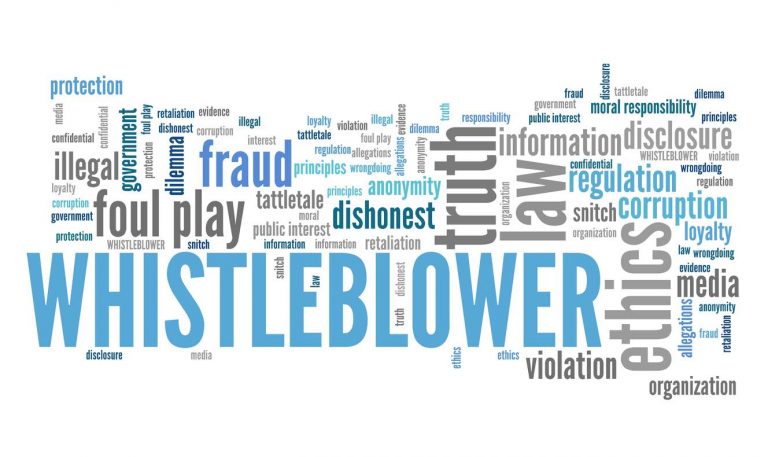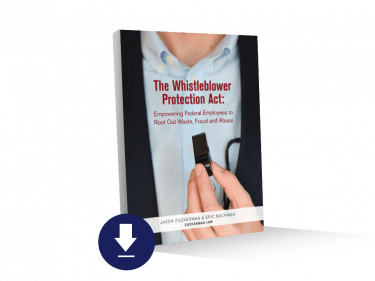
What is Required to Prove a Violation of the Whistleblower Protection Act?
To prove whistleblower retaliation under the WPA, 5 U.S.C. 2302(b)(8), a whistleblower must establish the following by preponderant evidence:
- A protected disclosure (aka the whistleblowing)
- A personnel action is taken, threatened, or not taken after the protected disclosure;
- The relevant officials knew of the protected disclosure; and
- A causal connection (contributing factor) exists between the disclosure and the personnel action
If the whistleblower meets this test, then the burden shifts to the employer to prove by clear and convincing evidence—which is significantly more onerous than the preponderance standard—that it would have taken the same action against the employee even if they had never blown the whistle.
If you are seeking representation in a Whistleblower Protection Act case, call us at 202-262-8959.
Download our guide to the Whistleblower Protection Act:
What disclosures are protected under the Whistleblower Protection Act?
The WPA protects federal employees against retaliation for making any disclosure that the employee reasonably believes evidences:
- a violation of any law, rule, or regulation;
- gross mismanagement;
- a gross waste of funds;
- an abuse of authority;
- a substantial and specific danger to public health or safety; or
- censorship related to research, analysis, or technical information that cause, or will cause, one of the above harms
Passed in 2012, the WPEA clarifies that a disclosure is protected even if the disclosure:
- is made to a person, including a supervisor, who participated in the wrongdoing disclosed;
- revealed previously disclosed information;
- is made by an employee who may have other motives for making the disclosure;
- is made while the employee was off duty;
- is about events that occurred a long time ago; or
- is made during the employee’s normal course of duties, provided the employee can show that the personnel action was taken “in reprisal for” the disclosure.
What options are available to pursue a Whistleblower Protection Act Case?
An employee who believes a federal employer has unlawfully retaliated against him or her has several options:
- The employee may file a complaint with the U.S. Office of Special Counsel (OSC). If OSC finds that the employee suffered retaliation, then it reports its findings to the MSPB and can petition the Board, on behalf of the employee, to correct the agency’s retaliatory action.
- If OSC finds no wrongdoing or retaliation, then the employee may file an individual right of action (“IRA”) appeal before the MSPB within 60 days of OSC’s determination. The employee can appeal the Board’s decision to the relevant federal Court of Appeals.
- The employee may appeal a retaliatory personnel action directly to the MSPB if the employee is eligible to do so and the retaliatory action is one of the personnel actions directly appealable to the MSPB.
It is important for employees to know that they may choose only one of the following options when they want to challenge an adverse action that:
- An appeal to the MSPB under 5 U.S.C. § 7701;
- A grievance filed under a collective bargaining agreement (for union employees); or
- A complaint filed with OSC, which can be followed by an Individual Right of Action (IRA) to the MSPB
Whichever option is chosen first is deemed an “election of remedies,” which means that the other two options can no longer be used.
This election of remedies does not, however, affect the right to pursue an EEO complaint (an EEO and OSC complaint may be pursued at the same time).
What is the Office of Special Counsel?
The OSC is an independent, federal investigative and prosecutorial agency. Its primary mission is to safeguard employee rights and hold government accountable, primarily by protecting employees from whistleblower retaliation
What is the Merit Systems Protection Board?
The MSPB is a quasi-judicial agency that adjudicates employee appeals and provides independent review and due process for employees and agencies.
What is an Individual Right of Action Appeal?
There are two ways in which an employee can bring an IRA appeal at the MSPB: 1) if OSC does not seek corrective action within 120 days of the filing of the complaint; or 2) if OSC closes its investigation of the complaint, the complainant has 65 days from the date of the written notice, or 60 days from the date of receipt of the notice, to file an IRA appeal. 5 U.S.C. § 1214(a)(3). The regulation incorporates the presumption of 5 C.F.R. § 1201.4(l) that a letter is received 5 days after mailing as applicable to the 60-day deadline for filing specified in the statute.
Prior to the enactment of the WPEA, the IRA appeal option was available only for § 2302(b)(8) claims. The WPEA expanded IRA appeals to cases brought under the following provisions of § 2302(b)(9):
- 2302(b)(9)(A)(i) – exercising any appeal, complaint, or grievance right granted by any law, rule, or regulation with regard to remedying a violation of paragraph (8);
- 2302(b)(9)(B) – testifying for or otherwise lawfully assisting any individual in the exercise of any appeal, complaint, or grievance right granted by any law, rule, or regulation;
- 2302(b)(9)(C) – cooperating with or disclosing information to the Inspector General of an agency, or the Special Counsel; and
- 2302(b)(9)(D) – refusing to obey an order that would require the individual to violate a law.
The IRA appeal option is not available for claims brought under § 2302(b)(9)(A)(ii), i.e., exercising any appeal, complaint, or grievance right granted by any law, rule, or regulation other than with regard to remedying a violation of paragraph (8).
In an IRA appeal, the Board may consider only the charges of whistleblowing that the appellant raised before OSC, i.e., the appellant must prove exhaustion of administrative remedies. Therefore, if the complainant is subjected to additional retaliation after filing an initial complaint with OSC, it is critical to document efforts to supplement the initial complaint.
An AJ’s inquiry into exhaustion of administrative remedies is limited to identifying (1) the whistleblowing disclosures and (2) the personnel actions that the appellant raised before OSC. The appellant must “give the [OSC] sufficient basis to pursue an investigation which might have led to corrective action.” Ward v. Merit Sys. Prot. Bd., 981 F.2d 521, 526 (Fed. Cir. 1992) (citing Knollenberg v. Merit Sys. Prot. Bd., 953 F.2d 623, 626 (Fed. Cir. 1992)).
IRA appeals are reviewed de novo, i.e., the IRA appeal must be viewed independently from OSC’s decision to close the complaint. Section 1221(f) of title 5, United States Code, expressly states: “[A] decision to terminate an investigation under subchapter II may not be considered in any action or other proceeding under this section.” 5 U.S.C. § 1221(f) (emphasis added). Section 1214 contains a similar prohibition:
A determination by the Special Counsel under this paragraph shall not be cited or referred to in any proceeding under this paragraph or any other administrative or judicial proceeding for any purpose, without the consent of the person submitting the allegation of a prohibited personnel practice.
5 U.S.C. § 1214(a)(3) (emphasis added). Under this statutory scheme, OSC’s internal decisions regarding an appellant’s complaint have no legal relevance to whether he or she may proceed with an IRA appeal. Congress took pains to protect OSC’s internal deliberations regarding the disposition of a complaint from Board review “to ensure that a whistleblower is not ‘penalized’ or ‘prejudiced’ in any way by OSC’s decision not to pursue a case.” Costin v. Dep’t of Health and Human Servs., 64 M.S.P.R. 517, 531 (1994). The MSPB can only order an appellant to produce OSC’s determination letter if the AJ explains why the letter is necessary and provides the opportunity to consent. See 5 U.S.C. § 1214(a)(2)(B); Bloom v. Dep’t of Army, 101 M.S.P.R. 79, 84 (2006).
What is required to prove jurisdiction in an IRA appeal?
An IRA appellant must show exhaustion of administrative remedies and make non-frivolous allegations that the appellant made a protected disclosure that was a contributing factor to the personnel action taken or proposed. Recently the Federal Circuit clarified that at the pleading stage, a MSPB AJ should not weight the evidence:
This court has made clear that the MSPB must “separate the issue of jurisdiction from that of the merits of a petitioner’s case.” Spencer v. Dep’t of the Navy, 327 F.3d 1354, 1356 (Fed. Cir. 2003) (citation omitted). And on several occasions, we have identified instances where the MSPB did not meet this requirement in the past. See id. We reiterate that at the jurisdictional stage, a petitioner need only assert non-frivolous allegations—allegations that are not “vague, conclusory, or facially insufficient,” and that the petitioner “reasonably believe[s]” to be true—of a protected disclosure that was a contributing factor to a reprisal. Johnston v. Merit Sys. Prot. Bd., 518 F.3d 905, 910 (Fed. Cir. 2008) (internal quotation marks and citation omitted). A petitioner’s credibility including, as in this case, consideration of affidavits submitted by an allegedly retaliatory supervisor claiming no knowledge of the petitioner’s protected disclosure or motivation to retaliate, “relate[s] to the merits of [the] claim.” Id. at 911, 912 n.3; see J.A. 6 (improperly considering affidavit of Mr. Piccolo’s supervisor at the jurisdictional stage). Non-frivolous allegations suffice at the jurisdictional stage precisely because, as here, the petitioner may not have access to all relevant documents or have been provided an opportunity to conduct discovery. See Johnston, 518 F.3d at 912; see Pet’r’s Original Br. 11-15, ECF No. 9 (detailing outstanding requests under the Freedom of Information Act). We have also required that petitioners in IRA appeals be provided “notice of deficiencies before a claim is finally dismissed” and “an opportunity to cure” their pleadings where specific details are “readily available.” Cahill v. Merit Sys. Prot. Bd., 821 F.3d 1370, 1375, 1376 (Fed. Cir. 2016).
Piccolo v. Merit Systems Protection Board, No. 2016-2374 (Fed. Cir. 2017).
What damages are available under the Whistleblower Protection Act?
A prevailing whistleblower can recover:
- lost wages,
- attorney’s fees,
- equitable relief (for example, reinstatement, rescinding a suspension, or modifying a performance evaluation), and
- uncapped compensatory damages (emotional-distress damages).
In addition, a whistleblower can recover fees, costs, or damages reasonably incurred due to a retaliatory investigation. Retaliatory investigations can take many forms, such as unwarranted referrals for criminal or civil investigations or extraordinary reviews of time and attendance records.
Does the Whistleblower Protection Act protect employees who exercise an appeal or grievance right?
Yes. Under 5 U.S.C. 2302(b)(9), agency officials may not take, fail to take, threaten to take a personnel action because an employee:
- Filed a complaint, grievance, or appeal;
- Testified or helped some else with one of these activities;
- Cooperated with or disclosed information to OSC or an Inspector General; or
- Refused to obey an order that would require the employee to violate a law
KEY TIP: whistleblowers should generally follow the doctrine of “obey now, grieve later”—unless carrying out an order would violate a statute, place the employee in clear physical danger, or result in irreparable harm
- After carrying out the order on an interim basis, the employee can then blow the whistle to agency officials, an OIG, OSC, the media, or Congress. Or the employee can address the concern through an agency grievance procedure.
To establish a prima facie case of retaliation for exercising whistleblowing, complaint, appeal, or grievance rights under Section 2302(b)(9), an employee must prove the following four elements by preponderant evidence:
- the employee, or someone identified with the employee, engaged in a protected activity;
- the agency took, failed to take, or threatened to take a personnel action;
- the official responsible for the personnel action knew about the employee’s protected activity; and
- A causal connection existed between the protected activity and the personnel action.
The WPEA split Section 2302(b)(9)(A) claims into two subcategories:
- Section 2302(b)(9)(A)(i). This subsection involves the exercise of appeal, complaint, or grievance rights that deal with remedying a violation of Section 2302(b)(8).
- Section 2302(b)(9)(A)(ii). This subsection involves the exercise of appeal, complaint, or grievance rights that do not deal with remedying a violation of Section 2302(b)(8).
- The elements for proving these two subcategories are the same, but the standard for proving causation differs depending on the type of case. Appeal rights also differ between these subcategories.
Hiring Experienced Whistleblower Protection Act Lawyers

- Eric Bachman served as Deputy Special Counsel, Litigation and Legal Affairs, OSC, where he spearheaded an initiative to combat whistleblower retaliation at the Department of Veterans Affairs. During Bachman’s tenure at OSC, the number of favorable actions for whistleblowers increased by over 50% agency-wide.
- Jason Zuckerman served as Senior Legal Advisor to the Special Counsel at OSC, where he worked on implementation of the Whistleblower Protection Enhancement Act and several high-profile investigations.
If you are seeking representation in a whistleblower protection case, click here, or call us at 202-262-8959 to schedule a free preliminary consultation.
How do I file a claim under the Whistleblower Protection Act?
What does the Whistleblower Protection Act Prohibit?
What remedies or damages are available under the Whistleblower Protection Act?











